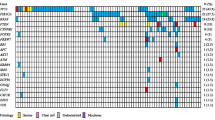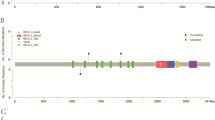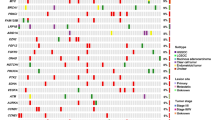Abstract
Parkin, a tumor suppressor gene located on chromosome 6q25-27, has been identified as a target for mutation in many human malignancies like breast, ovaries, cervical and lungs etc. After a preliminary report on the loss of heterozygosity and altered Parkin expression in breast and ovarian tumors, we aimed to study loss of heterozygosity in the Parkin gene associated microsatellite markers and its expression in human ovarian cancer patients from Indian population. We examined 102 paired normal and ovarian cancer samples for allelic loss in Parkin gene locus using Parkin gene associated microsatellite markers through loss of heterozygosity and changes in its expression through semiquantitative RT-PCR. Loss of heterozygosity identified common region of loss in Parkin locus with highest frequency for the intragenic marker D6S1599 (53%) whereas, 49 of 102 (48%) specimens showed decreased or no expression of Parkin in ovarian tumors. The study revealed that presence of loss of heterozygosity was significantly higher in both the intragenic markers (D6S1599 and D6S305) as compared with the locus of flanking region (D6S1008) with their p value 0.000001 and 0.00008, respectively. It also revealed that Parkin inactivation is probably a combination of loss of heterozygosity coupled with downregulation of Parkin gene through an alternative means like epigenetic mechanism. These data strongly supports the previous study and argue that Parkin is a tumor suppressor gene whose inactivation may play an important role in ovarian carcinoma.



Similar content being viewed by others

References
Landis SH, Murray T, Bolden S, Wingo PA (1998) Cancer statistics, 1998. Cancer J Clin 48:6–29
Jemal A, Siegel R, Ward E, Hao Y, Xu J, Murray T, Thun MJ (2008) Cancer statistics, 2008. CA Cancer J Clin 58(2):71–96
Boyle P, Levin B (2008) International Agency for Research on Cancer, and World Health Organization, “World cancer report 2008.” Distributed by WHO Press, Geneva, Switzerland
American Cancer Society. Facts & Figures 2009
GLOBOCAN (2008) Cancer incidence, mortality and prevalence worldwide. IARC 2008. IARC, Lyon
Theile M, Seitz S, Arnold W, Jandrig B, Frege R, Schlag PM, Haensch W, Guski H, Winzer KJ, Barrett JC, Scherneck S (1996) A defined chromosome 6q fragment (at D6S310) harbors a putative tumor suppressor gene for breast cancer. Oncogene 13:677–685
Bastian BC, LeBoit PE, Hamm H, Brocker EB, Pinkel D (1998) Chromosomal gains and losses in primary cutaneous melanomas detected by comparative genomic hybridization. Cancer Res 58:2170–2175
Reutzel D, Mende M, Naumann S, Störkel S, Brenner W, Zabel B, Decker J (2001) Genomic imbalances in 61 renal cancers from the proximal tubulus detected by comparative genomic hybridization. Cytogenet Cell Genet 93:221–227
Jin C, Martins C, Jin Y, Wiegant J, Wennerberg J, Dictor M, Gisselsson D, Strömbeck B, Fonseca I, Mitelman F, Tanke HJ, Hoglund M, Mertens F (2001) Characterization of chromosome aberrations in salivary gland tumors by FISH, including multicolor COBRA-FISH. Genes Chromosome Cancer 30:161–167
Jackson A, Carrara P, Duke V, Sinclair P, Papaioannou M, Harrison CJ, Foroni L (2000) Deletion of 6q16–q21 in human lymphoid malignancies: a mapping and deletion analysis. Cancer Res 60:2775–2779
Carvalho B, Veen AY, Gärtner F, Carneiro F, Seruca R, Buys CHCM, Kok K (2001) Allelic gains and losses in distinct regions of chromosome 6 in gastric carcinoma. Cancer Genet Cytogenet 131(1):54–59
De Souza AT, Hankins GR, Washington MK, Fine RL, Orton TC, Jirtle RL (1995) Frequent loss of heterozygosity on 6q at the mannose 6-phosphate/insulin-like growth factor II receptor locus in human hepatocellular tumors. Oncogene 10(9):1725–1729
Merlo A, Gabrielson E, Mabry M, Vollmer R, Baylin SB, Sidransky D (1994) Homozygous deletion on chromosome 9p and loss of heterozygosity on 9q, 6p, and 6q in primary human small cell lung cancer. Cancer Res 54:2322–2326
Visakorpi T, Kallioniemi AH, Syvänen AC, Hyytinen ER, Karhu R, Tammela T, Isola JJ, Kallioniemi OP (1995) Genetic changes in primary reccurent prostate cancer by comparative genomic hybridization. Cancer Res 55:342–347
Tahara H, Smith AP, Gaz RD, Cryns VL, Arnold A (1996) Genomic localization of novel candidate tumor suppressor gene loci in human parathyroid adenomas. Cancer Res 56:599–605
Sebsebe L, Lea P, Markku S, Mika N, Sirkku S, Kirsti HP, Tom B (2004) Loss of Heterozygosity at 6q is frequent and concurrent with 3p loss in sporadic and familial capillary hemangioblastomas. J Neuropathol Exp Neurol 63(10):1072–1079
Inoue M, Marx A, Zettl A, Ströbel P, Müller-Hermelink HK, Starostik P (2002) Chromosome 6 suffers frequent and multiple aberrations in thymoma. Am J Pathol 161(4):1507–1513
Mazurenko NN, Beliakov IS, Bliyev AY, Guo Z, Hu X, Vinokourova SV, Bidzhieva BA, Pavlova LS, Ponten J, Kisseljov FL (2003) Genetic alterations at chromosome 6 associated with cervical cancer progression. Mol Biol 37(3):404–411
Wan M, Sun T, Vyas R, Zheng J, Granada E, Dubeau L (1999) Suppression of tumorigenicity in human ovarian cancer cell lines is controlled by a 2 cM fragment in chromosomal region 6q24–q25. Oncogene 18:1545–1551
Sheng ZM, Marchetti A, Buttitta F, Champeme MH, Campani D, Bistocchi M, Lidereau R, Callahan R (1996) Multiple regions of chromosome 6q affected by loss of heterozygosity in primary human breast carcinomas. Br J Cancer 73:144–147
Colitti CV, Rodabaugh KJ, Welch WR, Berkowitz RS, Mok SC (1998) A novel 4 cM minimal deletion unit on chromosome 6q25.1-q25.2 associated with high grade invasive epithelial ovarian carcinoma. Oncogene 16:555–559
Tibiletti MG, Bernasconi B, Furlan D, Riva C, Trubia M, Buraggi G, Franchi M, Bolis P, Mariani A, Frigerio L, Capella C, Taramelli R (1996) Early involvement of 6q in surface epithelial ovarian tumors. Cancer Res 56:4493–4498
Cooke IE, Shelling AN, Le Meuth VG, Charnock ML, Ganesan TS (1996) Allele loss on chromosome arm 6q and fine mapping of the region at 6q27 in epithelial ovarian cancer. Genes Chromosom Cancer 15:223–233
Tibiletti MG, Trubia M, Ponti E, Sessa L, Acquati F, Furlan D, Bernasconi B, Fichera M, Mihalich A, Ziegler A, Volz A, Facco C (1998) Physical map of the D6S149–D6S193 region on chromosome 6Q27 and its involvement in benign surface epithelial ovarian tumours. Oncogene 16:1639–1642
Kitada T, Asakawa S, Hattori N, Matsumine H, Yamamura Y, Minoshima S, Yokochi M, Mizuno Y, Shimizu N (1998) Mutations in the parkin gene cause autosomal recessive juvenile parkinsonism. Nature (Lond) 392:605–608
Cesari R, Martin ES, Calin GA, Pentimalli F, Bichi R, McAdams H, Trapasso F, Drusco A, Shimizu M, Masciullo V, d’Andrilli G, Scambia G, Picchio MC, Alder H, Godwin AK, Croce CM (2003) Parkin, a gene implicated in autosomal recessive juvenile parkinsonism, is a candidate tumor suppressor gene on chromosome 6q25–q27. Proc Natl Acad Sci USA 100:5956–5961
Denison SR, Callahan G, Becker NA, Phillips LA, Smith DI (2003) Characterization of FRA6E and its potential role in autosomal recessive juvenile parkinsonism and ovarian cancer. Genes Chromosom Cancer 38:40–52
West A, Periquet M, Lincoln S, Lucking CB, Nicholl D, Bonifati V, Rawal N, Gasser T, Lohmann E, Hardy J, Brice A, Farrer M (2002) Complex relationship between Parkin mutations and Parkinson disease. Am J Med Genet 114:584–591
Picchio MC, Martin ES, Cesari R, Calin GA, Yendamuri S, Kuroki T, Pentimalli F, Sarti M, Yoder K, Kaiser LR, Fishel R, Croce CM (2004) Alterations of the tumor suppressor gene Parkin in non-small cell lung cancer. Clin Cancer Res 10:2720–2724
Mehdi SJ, Alam MS, Batra S, Rizvi MMA (2010) Allelic loss of 6q25-27, the PARKIN tumor suppressor gene locus, in cervical carcinoma. Medical Oncology (in press). doi:10.1007/s/12032-010-9633-x
Denison SR, Wang F, Becker NA, Schüle B, Kock N, Phillips LA, Klein C, Smith DI (2003) Genetic alteration in the common fragile site gene PARK2 in ovarian and other cancers. Oncogene 22:8370–8378
Wang F, Denison S, Lai JP, Philips LA, Montoya D, Kock N, Schüle B, Klein C, Shridhar V, Roberts LR, Smith DI (2004) Parkin gene alterations in hepatocellular carcinoma. Genes Chromosom Cancer 40:85–96
Veeriah S, Taylor BS, Meng S, Fang F, Yilmaz E, Vivanco I, Janakiraman M, Schultz N, Hanrahan AJ, Pao W, Ladanyi M, Sander C, Heguy A, Holland EC, Paty PB, Mischel PS, Liau L, Cloughesy TF, Mellinghoff IK, Solit DB, Chan TA (2010) Somatic mutations of the Parkinson’s disease-associated gene PARK2 in glioblastoma and other human malignancies. Nat Genet 42(1):77–82
Benedet JL, Bender H, Jones H III, Ngan HYS, Pecorelli S (2000) FIGO staging classifications and clinical practice guidelines in the management of gynecologic cancers. Int J Gynecol Obstet 70:209–262
Sambrook J, Russell DW (2001) Molecular cloning: a laboratory manual, 3rd edn. Cold Spring Harbor Lab, Plainview
Yuping X, Lili M, Chengbo H, Jinyi L, Lei X, Yan X (2007) MSI/LOH and extron expression of the FHIT gene in gastric carcinoma. Front Med China 1(1):99–103
Preacher KJ (2001) Calculation for the chi-square test: an interactive calculation tool for chi-square tests of goodness of fit and independence [Computer software]. Available from http://www.quantpsy.org
Foulkes WD, Ragoussis J, Stamp GWH, Allan GJ, Trowsdale J (1993) Frequent loss of heterozygosity on chromosome 6 in human ovarian carcinoma. Br J Cancer 67:551–559
Wan MZT, D’Abling G, Zheng I, Veliscu M, Dubeau L (1994) Three distinct regions of chromosome 6 are targets of loss of heterozygosity in human ovarian carcinomas. J Oncol 5:1043–1048
Agirre X, Román-Gómez J, Vázquez I, Jiménez-Velasco A, Garate L, Montiel-Duarte C, Artieda P, Cordeu L, Lahortiga I, Calasanz MJ, Heiniger A, Torres A, Minna JD, Prósper F (2006) Abnormal methylation of the common PARK2 and PACRG promoter is associated with downregulation of gene expression in acute lymphoblastic leukemia and chronic myeloid leukemia. Int J Cancer 118:1945–1953
Acknowledgement
The contribution of Dr. Shuaib Zaidi , Batra Hospital (New Delhi) is acknowledged with thanks. The authors also acknowledge University Grants Commission (UGC), New Delhi for providing fellowship to one of the co-authors (Syed Jafar Mehdi).
Author information
Authors and Affiliations
Corresponding author
Rights and permissions
About this article
Cite this article
Mehdi, S.J., Ali, A. & Rizvi, M.M.A. Parkin Gene Alterations in Ovarian Carcinoma from Northern Indian Population. Pathol. Oncol. Res. 17, 579–586 (2011). https://doi.org/10.1007/s12253-010-9351-x
Received:
Accepted:
Published:
Issue Date:
DOI: https://doi.org/10.1007/s12253-010-9351-x



